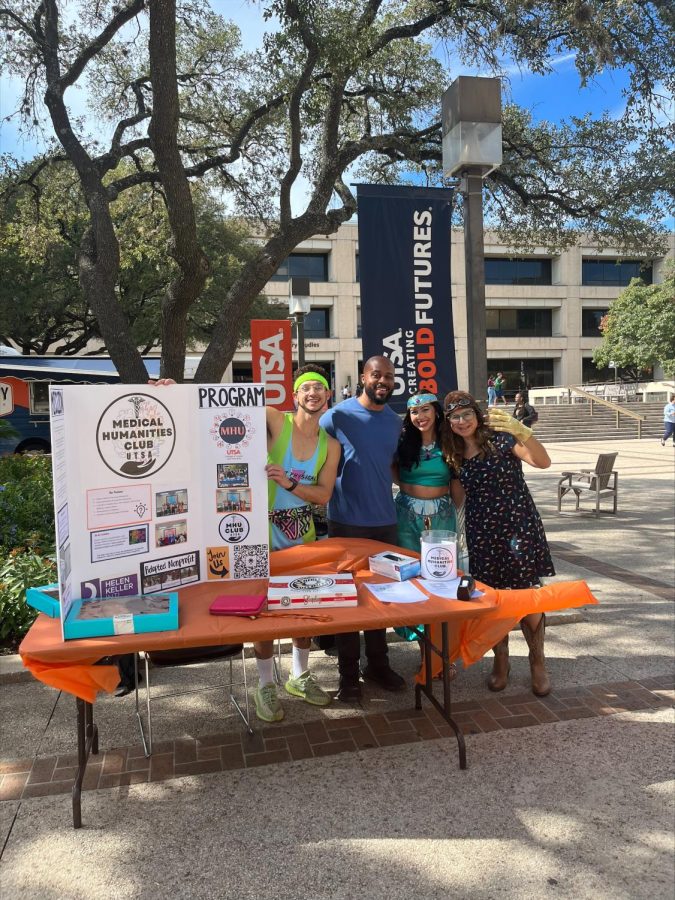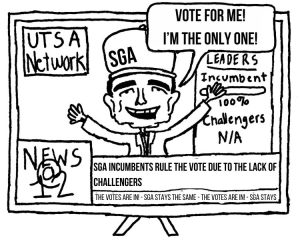New grant will help internationalize the medical humanities program
Photo courtesy of Şerife Tekin
The Medical Humanities Club tabling in the Sombrilla.
November 22, 2022
UTSA’s Medical Humanities program was launched in 2016. The program offers an interdisciplinary approach to medicine and healthcare. Şerife Tekin, associate professor of philosophy, has served as the program’s director since 2021 and has been working on further building the program through new programs and partnerships.
Of note is the $182,000 Undergraduate International Studies and Foreign Language Program grant that the program received this year from the U.S. Department of Education. Tekin explained that the grant will help internationalize the program and allow students to engage in study abroad programs and field studies, giving them international exposure. The program’s curriculum will also be diversified.
The grant will further help establish the Vocalize San Antonio program, through which students can intern as medical interpreters in clinics across San Antonio and South Texas.
This opportunity is one of several others that students in the program are encouraged to participate in. In addition, the program also offers students internship opportunities to get hands-on experience in the medical field.
“They get course credit, but their internship involves going and actually doing something in the hospital or working as a scribe or working as a medical interpreter … so that [students] have hands-on experience with patients but also face time with patients,” Tekin said.
Tekin has also helped grow the Medical Humanities Club, which connects students and faculty outside the classroom.
“I want to have as much face time with students as I can and I want faculty to also have a lot of out-of-class interactions with students because, at an institution like UTSA, our students do so well with really close mentorship from faculty who knows the system and who knows how to navigate the system,” Tekin said.
Furthermore, under Tekin, the program has also established a partnership with the University of Oxford’s Collaborating Centre for Health and Social Care, providing students with more exposure to the discipline. Tekin also mentioned that a partnership with a university in Belgium is underway as the latter is about to start its medical humanities program.
Along with these opportunities, students take classes in science, social sciences and humanities on topics like ethics and the philosophy of science. Students also take language classes — a skill Tekin describes as being important in the context of making healthcare more accessible.
“In the healthcare context, we’re dealing with [vulnerable] people,” Tekin said. “The interesting component of that relationship to me is building trust between patient and caregiver [or] healthcare professional. With that in mind, [we want students] to have a scientifically rigorous training to become good providers, but [we also want them to be] able to obtain [the] patient’s trust [and] emotionally connect to them.”
While medical humanities weaves its way into the rigorous training that medical school students undergo, UTSA offers this interdisciplinary approach to its undergraduate students, which Tekin describes as a “huge plus” for students in the program.
As previously mentioned, the program aims to train students holistically, exposing them to the more humanistic aspects of healthcare. Currently, the program offers students three concentrations: a pre-medicine track, a health careers track and a pre-advanced practice provider track. Students enrolled in the program have flexibility as they can choose the path that best suits their needs. Tekin has also initiated adding a minor in medical humanities.
Students who graduate from the program have gone on to pursue different career routes, including medical school and graduate school, as well as business and law.
“I think the degree is very flexible and students have a lot of options … as we are getting more graduates placed in good [graduate] programs … the word of mouth kind of gets around,” Tekin said.
“I think there is a big push, at least in … the humanities areas, to make the study of philosophy or history or languages more relevant to everyday life and I think healthcare provides these opportunities,” Tekin added.
More information about UTSA’s Medical Humanities program can be found at https://future.utsa.edu/programs/undergraduate/medical-humanities/.












